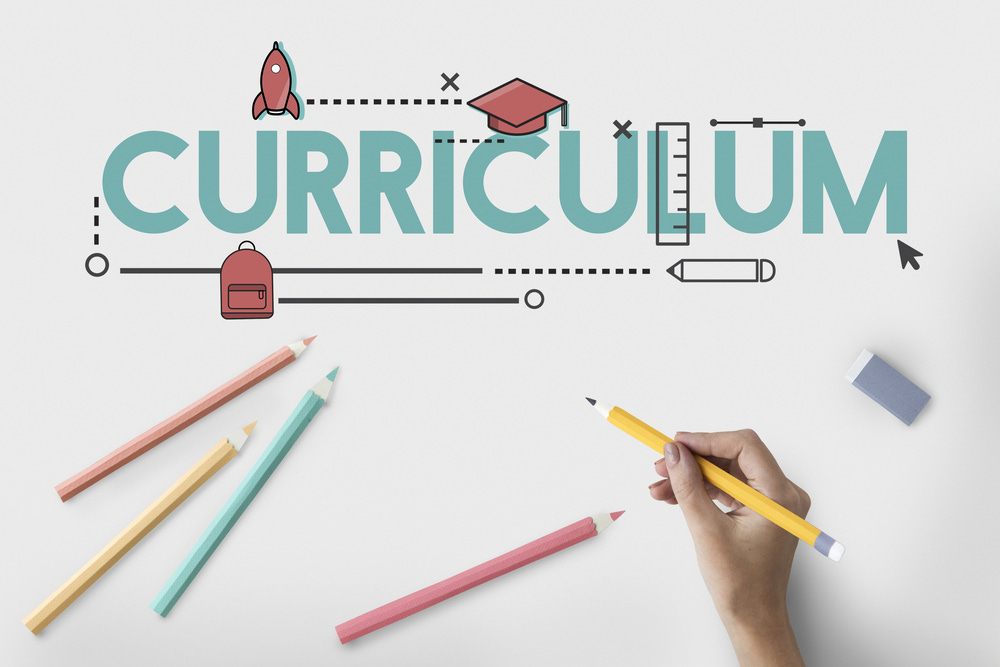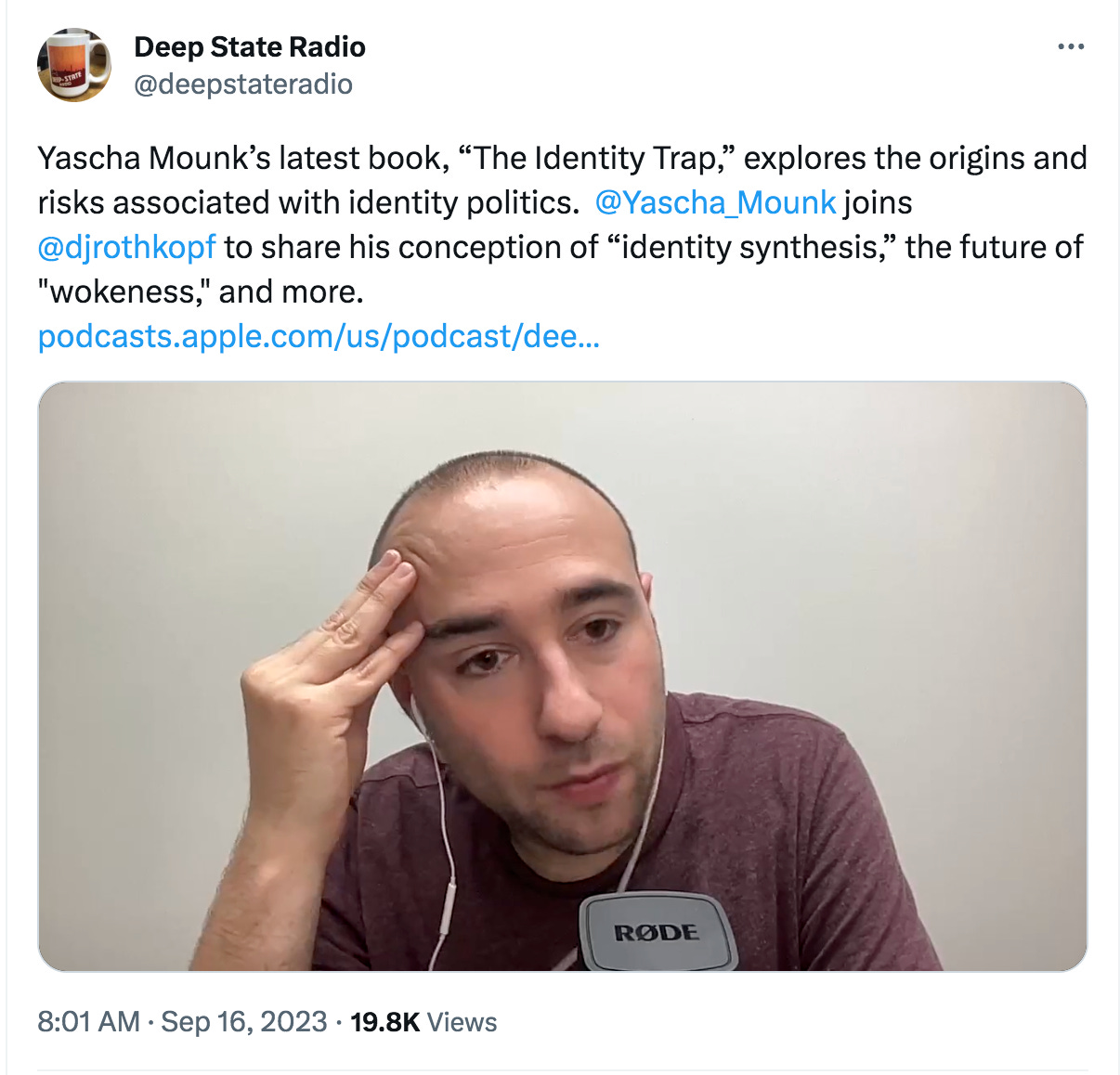E-Pluribus | September 20, 2023
The "identity" crisis on college campuses; fed up school parents; and who should be in charge of college curricula?
A round-up of the latest and best writing and musings on the rise of illiberalism in the public discourse:
Matthew Reisz on Yascha Mounk: Identity-focused campus culture is new threat to democracy
While Yascha Mounk considers himself a member of the left, that doesn’t mean he’s comfortable with all the latest progressive conventional wisdom. At Times Higher Education, Matthew Reisz talks to Mounk about his new book, The Identity Trap: A Story of Ideas and Power in Our Time.
[H]aving thoroughly skewered right-wing populism and its brash demagogues in popular books, his Good Fight podcast series and essays for The Atlantic, [Yascha] Mounk’s next target may surprise his considerable fanbase. This month, The Identity Trap: A Story of Ideas and Power in Our Time, published by Penguin, explains how dangerous styles of thinking developed in and once largely confined to the academy have now gone mainstream – and why we should all be worried.
Criticising “woke” campus culture is a staple for the conservative right so how did Mounk, a darling of the liberal left and professor of the practice of international affairs at Johns Hopkins University, end up sharing the same concerns?
[ . . . ]
While Mounk is careful to avoid the word “woke” and even the term “identity politics” as too contentious, it would not be unfair to describe The Identity Trap as an “anti-woke” book. There have already been quite a few others, including predictable polemics from right-wing pundits about “snowflakes” and “cancel culture”. So, as a self-described “longtime member of the left”, where does Mounk feel that he is breaking new ground?
“What makes it distinctive,” he replies, “is that it’s the first comprehensive attempt to understand where this ideology comes from [and] how it could become so influential in the mainstream”. The book “then builds its critiques on a more intimate and sophisticated understanding of these ideas”.
Unlike many conservative writers, Mounk accepts the contention that “many societies that claim to be just and democratic, that claim to treat all their members equally, have historically failed to live up to those ideals in terrible ways…Just about every democratic society today continues to discriminate against vulnerable minorities in all kinds of ways.”
What he totally disagrees with, however, is the idea that “we need to do away with [our] universal aspirations because they’re just pulling the wool over people’s eyes. So the only way to build a better society is to explicitly build politics around groups in such a way that how you’re treated depends on your ethnic, religious and sexual identity.” On the contrary: universalist liberal values remain “the best guide to building a better future”, according to The Identity Trap, “especially if we recognize that these ideals are yet to be fully realized”.
Read the whole thing.
Tal Fortgang: Boiling Over
A long-time complaint of teachers is a lack of involved parents, but lately, some schools seem to believe certain parents have overstepped their bounds. At City Journal, Tal Fortgang writes about parents who have had it with schools who seem to think parents have no role to play in determining what is and is not appropriate material for their children.
These cases [two school board lawsuits] display one county’s [Montgomery County, Maryland] unrelenting effort to train children to see the world through a progressive lens while maintaining plausible deniability. It’s just LGBTQ-inclusive education, the county officials say; no one is telling your kid what to think; and it may not be your kids who are being socially transitioned in secret. For parents unpersuaded by such assurances, litigation has so far proved unavailing.
But even these two cases look quaint compared with a recent development in California. There, Attorney General Rob Bonta has announced that kids in California have a right to keep their school-based social transition secret from their parents. After the Chino Valley School District in Southern California took the opposite stance—mandating that public schools in its jurisdiction disclose social-transitioning plans to parents—Bonta sued, arguing that such a policy violates students’ equal rights under law and subjects them to potential harm at the hands of non-affirming parents. (It remains to be seen whether the courts will find that this potential harm is also “too attenuated” to find standing.) In doing so, Bonta has pitted children against their parents, construing even knowledge of a gender transition as a grievous potential harm, widening beyond all recognition the exception to the principle that parents generally get to speak for their minor children.
If the new view of gender and sexuality continues to gain adherents within the American public school system, it could eventually become as universal as the Pledge of Allegiance once was. The veneer of non-ideological education is vanishing, and K–12 schools are expanding their institutional reach to crowd parents out. Parents who dissent from progressive ideas will increasingly need to pursue other educational options for their kids.
Public schools ostensibly developed to achieve some related goals: acclimate young Americans to a common culture; teach them the basic skills needed to be economically productive; and cultivate good citizens. Increasingly, however, they do the opposite. They advance radical ideas in an attempt to forge a new common culture rather than transmit the existing one. They prioritize individual expression and adventures in self-understanding over preparing young people to be part of institutions larger than themselves: families, the economy, the nation itself.
Read it all.
Emma Pettit: Who Should Shape What Colleges Teach?
Even as parents and schools in Maryland fight over who should be in charge of the primary and secondary education of children, Emma Pettit at The Chronicle of Higher Education asks, “Who Should Shape What Colleges Teach?” Public education has a long tradition in this country, but putting the federal government in charge of what gets taught is something that gives pause to those on both sides of the ideological spectrum.
[A]ccording to a new national poll from The Chronicle, Americans from both major political parties tend to oppose substantial government influence over what’s taught in college classrooms. Only 37 percent of respondents say that state governments should have a great deal or a good amount of sway. For the federal government, that figure was 32 percent. Many more respondents support this level of influence from internal actors — professors, students, and college administrators — and also from business and industry leaders.
This bipartisan finding “could be interpreted as a knowing rejection by people across the ideological spectrum” of the type of law that Gov. Ron DeSantis, a Republican of Florida, and the state’s Republican-majority legislature, along with several other states, have passed, Amy J. Binder, an author of books about student political activism and higher ed, wrote in comments to a reporter about the results. (Many similar bills have not passed.)
[ . . . ]
When it comes to the state’s role in determining college curriculum, Democrats and Republicans answered similarly. Minorities of survey respondents — 38 percent and 37 percent, respectively — said it should have a good amount or great deal of influence. Binder, a sociologist at The Johns Hopkins University, was “kind of surprised,” and unsure of why, there wasn’t much difference between the two parties. “It is kind of a remarkable finding, given our polarized context,” she said.
[ . . . ]
Though Democrats and Republicans agreed on the state government’s role, Democrats were more likely to favor influence by professors and by students on the college curriculum, and Republicans to favor influence by business and industry leaders. Fewer conservatives than moderates or liberals said that the federal government should have considerable influence on what’s taught: at 26 percent compared with 36 and 34 percent.
That Democrats are more apt to trust professors to substantially affect college curricula makes sense, Binder wrote in comments to a reporter, given other survey research that shows Democrats have greater trust than Republicans do in institutional expertise and elite professional knowledge. Similarly, the finding that conservatives are warier of the federal government’s influence on curricula tracks with the relatively high level of mistrust Republicans report in the federal government, over all, Binder wrote. As of 2022, 9 percent of Republicans and Republican-leaning independents said they trust the government to do what is right all or most of the time, compared with 29 percent of their Democrat counterparts, according to the Pew Research Center. (The center noted that trust in government has been “consistently higher among members of the party that controls the White House than among the opposition party.”)
Read it all here.
Around Twitter (X)
Via Steve McGuire. Now that’s what I call a Diversity & Inclusion statement!
When is a research center not a research center? Apparently when it’s Ibram X. Kendi’s Center for Antiracist Research, and it doesn’t actually produce research. More from the Free Beacon on a story we mentioned yesterday:
And finally, from a recent interview, Yascha Mounk on the you-say-up-I-say-down verbal combat that passes for dialogue in the present day. (click for video)









